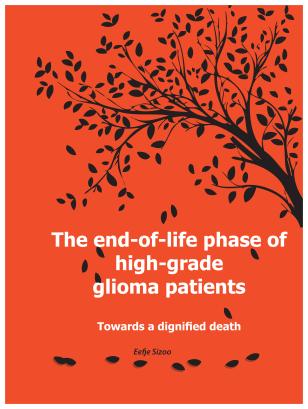Author: Eefje Sizoo
Date: 11-12-2013
Promotor: Prof. dr. Martin Taphoorn and Prof. dr. Luc Deliens
Co-Promotor: Prof. dr. Roeline Pasman and Prof. dr. Jaap Reijneveld
SUMMARY OF THE DISSERTATION
Background
In the end-of-life (EOL) phase, high-grade glioma (HGG) patients have a high symptom burden and often lose independence because of physical and cognitive dysfunction. This might affect the patient's personal dignity. We aimed to (a) assess the proportion of HGG patients dying with dignity as perceived by their relatives and (b) identify disease and care factors correlated with dying with dignity in HGG patients.
Methods
We approached relatives of a cohort of 155 deceased HGG patients for the study. Participants completed a questionnaire concerning the EOL phase of the patient, covering several subthemes: (a) symptoms and signs, (b) healthrelated quality of life, (c) decision making, (d) place and quality of EOL care, and (e) dying with dignity.
Results
Relatives of 81 patients participated and 75% indicated that the patient died with dignity. These patients had fewer communication deficits, experienced fewer transitions between health care settings in the EOL phase, and more frequently died at their preferred place of death. Relatives were more satisfied with the physician providing EOL care and reported that the physician adequately explained treatment options. Multivariate analysis identified satisfaction with the physician, the ability to communicate, and the absence of transitions between settings as most predictive of a dignified death.
Conclusions
Physicians caring for HGG patients in the EOL phase should timely focus on explaining possible treatment options, because patients experience communication deficits toward death. Physicians should strive to allow patients to die at their preferred place and avoid transitions during the last month of life.

